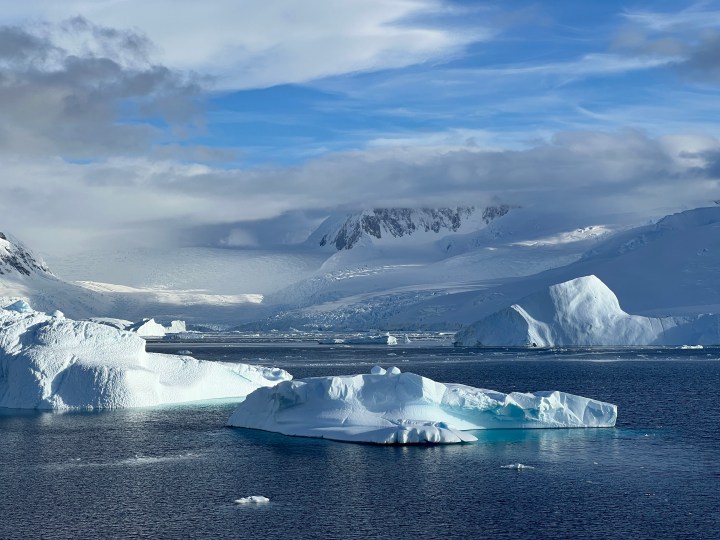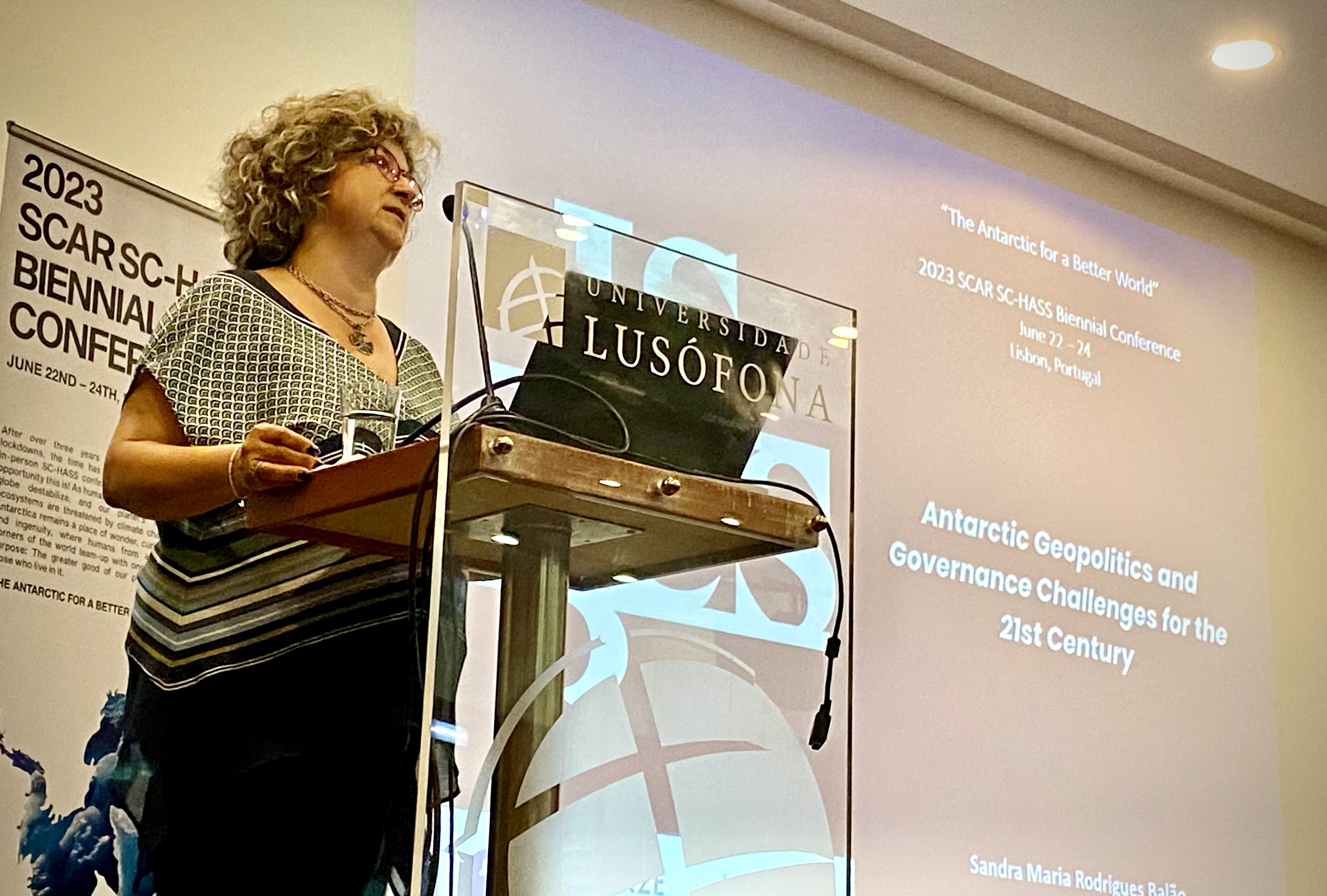SCIENTIFIC COMMITTEE ON ANTARCTIC RESEARCH
The price of opposition: Geopolitics and governance gridlock divides Antarctica

Politricks could be suffocating efforts to turn humanity’s best data into protection, legal experts have told polar scientists in Lisbon. Failure to review key governance bodies and decision-making processes may also hold to ransom the future of a wilderness that spans 10% of Earth.
Lisbon, Portugal — A Scientific Committee on Antarctic Research (SCAR) conference has shone a spotlight on mounting concerns about the precarious state of decision-making in the South Pole region. During keynote speeches and other panels held in Lisbon end June, scholars heard about the conflict between data-driven evidence and political agendas within the Antarctic Treaty System and its Committee for Environmental Protection.
China and Russia as well as other Antarctic Treaty member states have been accused of rejecting science-based decisions that advocate protections for penguins and south polar seas. This strikes at the heart of consensus-based Antarctic governance, according to Professor Kees Bastmeijer, a leading polar law expert at the University of Groningen in the Netherlands.
Increasingly politicised, such decisions are making it harder to manage a wilderness that is still relatively pristine compared with the rest of the world, Bastmeijer told a group of fellow researchers gathered at Lisbon’s Universidade Lusófona. The conference’s attendees included 110 humanities and social scientists from Australia, South Africa, Sweden, Turkey and a range of other states interested in the Antarctic.
Not just China, Russia
Consensus — the absence of objection — is not only challenged by China and Russia, Bastmeijer hastened to add: “Many different states”, including the United States, have also been involved in thwarting decisions.
Antarctica is, however, increasingly buckling under internal and external pressures. The latter has brought plastic waste, and, in the past four years to 2023, a 40% growth in sightseers to more than 100,000 heads, he said.

The Scientific Committee on Antarctic Research conference was hosted end June at Lisbon’s
Universidade Lusófona. (Photo: Tiara Walters)
As tourists increase, the ice is also receding at record lows, and projections indicate the decline of Antarctic ecosystems within decades. Within this century, up to 97% of land-based Antarctic species could decline unless “greater conservation efforts” are applied.
Acting in the best conservation interests of Antarctica requires appreciating the significance of the 1959 Antarctic Treaty, which governs the region and belongs to no one while the indefinite agreement is in force, according to Professor Akiho Shibata from Kobe University.
Legal obligations: heeding the best-available data
Citing China’s interpretations of treaty text to challenge scientific recommendations, Shibata questioned a science-based governance system that repeatedly dismisses peer-reviewed data. The evidence might not always leave every stone unturned, but then the treaty’s environmental protocol accepts that effective science — as a dynamic system of enquiry — does not work that way.
In force since the end of the 1990s, the Madrid Protocol describes Antarctica’s environmental laws and legally obliges the treaty’s 29 decision-making signatories, which include China and Russia, “to draw upon the best scientific and technical advice available”.
SCAR and the environmental protection committee each plays a chief advisory role to treaty consultative meetings on how to interpret data for decisions and policies.
“There is a clear demarcation of responsibility,” said Shibata, a law expert who directs Kobe’s Polar Co-operation Research Centre. “The consultative meeting can reject, but it should not question the substantive content of this expert scientific and environmental advice.”
Yet, at a Berlin meeting in 2022, China, but not Russia, blocked an emperor penguin rescue effort by arguing that Antarctica’s flightless birds were not threatened — based on non-scientific data of polar bears which live in the Arctic, the opposite end of the globe. (It is widely reported by scientific studies that emperors face extinction by 2100.)
The Helsinki consultative meeting, earlier in June, further underscored the challenges and complexities of Antarctic governance. Bastmeijer and Shibata pointed out that tensions between scientific recommendations and political interests were evident here, too, raising questions about the effectiveness of the consensus-based approach.
The approach is complicated by the fact that Antarctic states widely advocate the “rational use” of natural resources while also grappling with ecological collapse.
Some commentators have cited incomplete data and unresolved fishing and territorial concerns to explain hesitance by China and Russia. State officials have not responded to requests for comment.
Antarctica connects all major oceans
In her keynote address, the University of Lisbon’s Professor Sandra Balão stressed Antarctica’s position as the centrepiece among all major oceans, underlining the relevance of its strategic location for great powers.
Emphasising the need to avoid provocations, the polar geopolitician said activities in this region hold significant implications for the delicate global balance of power.

The University of Lisbon’s Professor Sandra Balão during her keynote address at the SCAR conference. The academic’s speech dived into what she described as ‘provocative’ Antarctic geopolitics. (Photo: Tiara Walters)
For instance, Antarctica’s mining ban has no expiry date, but from 2048 onwards it can be reviewed and thus this ban is not immune to expiry. This has caused ongoing confusion and may explain Russia’s seemingly unmatched search for minerals without official recognition from treaty bodies, which have not responded to our questions. Russia claims these activities are scientific, but the treaty does not define what science is.
Balão told Daily Maverick that “Russia has been conducting these dual type of activities”, but cautioned that “one interpretation of the law, the written law” could lead to “an escalation situation in Antarctica and maybe we will also face the use of force in that region”.
The conference deliberated other conservation matters, including how decisions can consider a growing research area — whether Antarctic nature should have rights similar to humans.
Consensus — not the only game in town
As the Lisbon discussion was underway, the Commission for the Conservation of Antarctic Marine Living Resources faced more setbacks at a Chile special meeting to establish marine-protected areas — due to “two countries” blocking consensus since 2017.
The Antarctic and Southern Ocean Coalition, a non-profit environmental group with exclusive observer status, criticised the commission’s decision system as dysfunctional.
It stopped short of naming those two countries, reported to be China and Russia. (In recent years, Norway has also exercised a veto.)
Consensus is not the only game in town, as Greenpeace has argued in its critique of the disappointing Chile negotiations.
The widely fêted oceans treaty, which was adopted at the UN in June and allows voting, may offer an alternative approach.
“The commission’s system of consensus decision-making is fundamentally broken. But decisions under the Global Ocean Treaty,” said Chris Thorne of Greenpeace’s Protect the Oceans campaign, “allows voting on decisions.”
Breaking the gridlock
Reviewing the environmental protection committee’s performance and investing in consensus processes, described as a cornerstone of governance by Bastmeijer and Shibata, may be essential.
A lesser-known fact is that majority views do not always reach the consultative meeting, even though the protocol provides for that option in reporting, Bastmeijer pointed out.
“There is a need to reconsider the role of Antarctic Treaty System bodies,” stressed Bastmeijer who, equally, praised the committee for doing a “good job” of tackling comprehensive impact studies.
To address these concerns, Bastmeijer, Shibata and experts from various universities and research centres last week released a prepublication research draft on consensus-making. The peer-reviewed draft also proposes solutions to strengthen decisions, particularly in the context of Antarctic tourism.
Bastmeijer, in Lisbon, had a trenchant word of advice for those accused of weaponising consensus.
By repeatedly sticking a spanner in the slow-turning wheel of consensus, especially at a time of global ecological urgency, a state risked an own goal.
“Think about the system as a whole,” Bastmeijer proposed. “If you block consensus, what price do you have to pay for it?” DM
Read our other recent coverage of the 45th Antarctic Treaty consultative meeting in Helsinki:
HELSINKI EXPLAINED: Antarctica’s mining ban may face meltdown, but let’s pretend everything’s chill
‘Artivism’: Extinction Rebellion calls for ‘forever ban’ on mining in Antarctica
IPCC co-chair lifts the ‘Ice Curtain’ at Antarctic climate meeting in Finland
Helsinki or high water? Summit tackles Antarctica’s desperate battle
No More Mister Ice Guys: Russia, SA fail to take a climate stand at top Antarctic meeting in Finland
Tiara Walters is a full-time reporter for Daily Maverick’s Our Burning Planet unit. Walters’s travel to Lisbon and Helsinki was made possible, in part, by the support of the Scientific Committee on Antarctic Research, the Friedrich Naumann Foundation and the Finnish Embassy to South Africa.
To read all about Daily Maverick’s recent The Gathering: Earth Edition, click here.



















 Become an Insider
Become an Insider
Comments - Please login in order to comment.